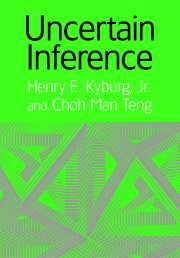Book contents
- Frontmatter
- Contents
- Preface
- 1 Historical Background
- 2 First Order Logic
- 3 The Probability Calculus
- 4 Interpretations of Probability
- 5 Nonstandard Measures of Support
- 6 Nonmonotonic Reasoning
- 7 Theory Replacement
- 8 Statistical Inference
- 9 Evidential Probability
- 10 Semantics
- 11 Applications
- 12 Scientific Inference
- Names Index
- Index
1 - Historical Background
Published online by Cambridge University Press: 07 December 2009
- Frontmatter
- Contents
- Preface
- 1 Historical Background
- 2 First Order Logic
- 3 The Probability Calculus
- 4 Interpretations of Probability
- 5 Nonstandard Measures of Support
- 6 Nonmonotonic Reasoning
- 7 Theory Replacement
- 8 Statistical Inference
- 9 Evidential Probability
- 10 Semantics
- 11 Applications
- 12 Scientific Inference
- Names Index
- Index
Summary
The theory of Induction is the despair of philosophy–and yet all our activities are based upon it.
Alfred North Whitehead: Science and the Modern World, p. 35.Introduction
Ever since Adam and Eve ate from the tree of knowledge, and thereby earned exile from Paradise, human beings have had to rely on their knowledge of the world to survive and prosper. And whether or not ignorance was bliss in Paradise, it is rarely the case that ignorance promotes happiness in the more familiar world of our experience—a world of grumbling bellies, persistent tax collectors, and successful funeral homes. It is no cause for wonder, then, that we prize knowledge so highly, especially knowledge about the world. Nor should it be cause for surprise that philosophers have despaired and do despair over the theory of induction: For it is through inductive inferences, inferences that are uncertain, that we come to possess knowledge about the world we experience, and the lamentable fact is that we are far from consensus concerning the nature of induction.
But despair is hardly a fruitful state of mind, and, fortunately, the efforts over the past five hundred years or so of distinguished people working on the problems of induction have come to far more than nought (albeit far less than the success for which they strove). In this century, the debate concerning induction has clarified the central issues and resulted in the refinement of various approaches to treating the issues. To echo Brian Skyrms, a writer on the subject [Skyrms, 1966], contemporary inductive logicians are by no means wallowing in a sea of total ignorance and continued work promises to move us further forward.
- Type
- Chapter
- Information
- Uncertain Inference , pp. 1 - 20Publisher: Cambridge University PressPrint publication year: 2001



